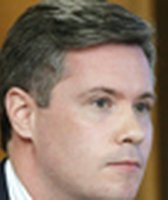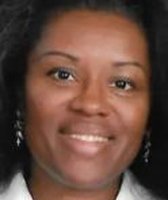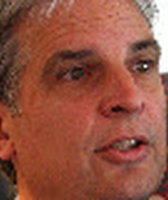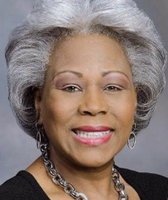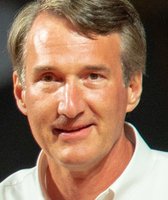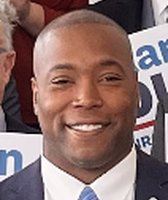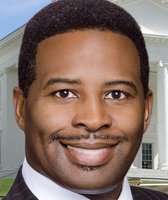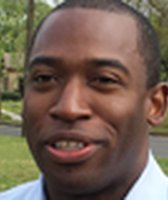Get PolitiFact in your inbox.
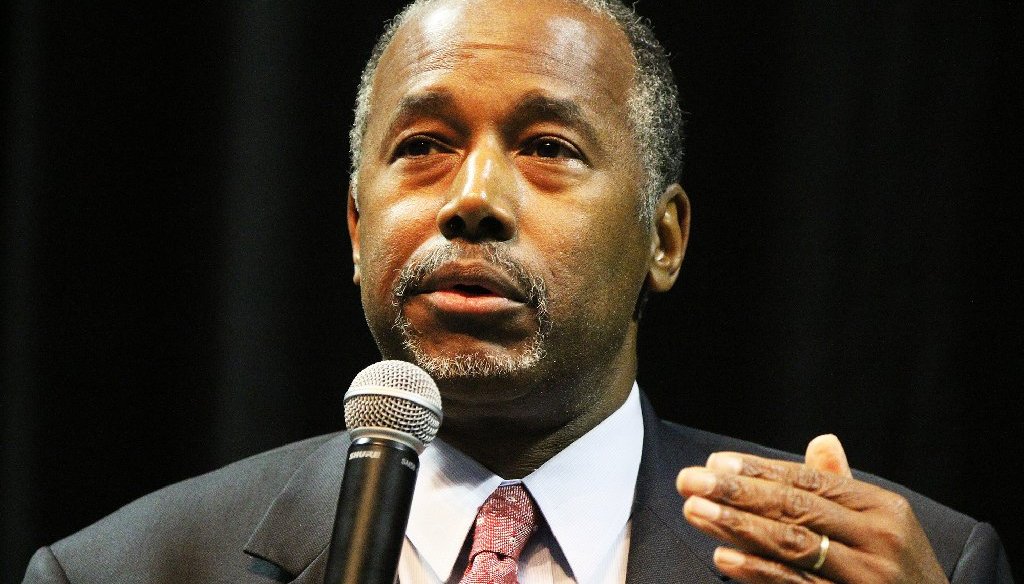
Ben Carson credited Thomas Jefferson with helping craft the Constitution during a Nov. 22 interview on C-SPAN.
Carson falsely says Thomas Jefferson helped 'craft' the Constitution
During a recent TV interview, Republican presidential candidate Ben Carson was asked which Founding Father impressed him the most.
"I’m particularly impressed with Thomas Jefferson, who seemed to have a very deep insight into the way people would react and tried to craft a constitution in a way that would control people’s natural tendencies and control the natural growth of government," Carson replied during a Nov. 22 broadcast on C-SPAN.
Our ears perked up, because Jefferson was an ocean away from Philadelphia during the late spring and summer of 1787 when the Constitutional Convention met at Independence Hall. He was in Paris, serving as minister to France for the Confederation Congress.
So did Jefferson really play a role in crafting the U.S. Constitution? Let’s take a look.
Although Carson did not acknowledge Jefferson’s absence from the convention in the C-SPAN interview, he did note it in his recently published book "A More Perfect Union," which urges Americans to "reclaim our constitutional liberties."
Ying Ma, a spokeswoman for Carson, backed the claim about Jefferson’s role in crafting the Constitution by pointing to a biography of the third president posted on the Library of Congress website. It says, "Although Thomas Jefferson was in France serving as United States minister when the federal constitution was written in 1787, he was able to influence the development of the federal government though his correspondence."
We contacted four Jefferson historians, and they all disagreed with Carson’s statement and evidence. When it came to the drafting of the constitution, which was done under a cloak of secrecy, they say Jefferson was in the dark.
"Jefferson didn’t know what was going on at all," said Joseph Ellis, a Pulitzer Prize-winning historian who wrote "American Sphinx: The Character of Thomas Jefferson."
Peter Onuf, a retired University of Virginia professor who specialized in Jefferson, wrote in an email, "Jefferson never ‘crafted’ a constitution (federal or state), nor did he have any influence over the secret proceedings at Philadelphia. Technically speaking, Jefferson was not a ‘founder’ at all, having been absent from the founding - but Carson is certainly not alone in according him that status."
Jefferson was abroad from August 1784 through November 1789. He maintained steady correspondence with James Madison, who would become known as the "Father of the Constitution." Historians say Jefferson indirectly may have influenced Madison’s political thinking when, in 1785, he shipped to his friend almost 200 books from Paris on government, philosophy, religion and other subjects. Madison delved deeply into the books.
Featured Fact-check
But when it came to forming a government, Jefferson and Madison were miles apart in thought and distance. Jefferson opposed the creation of a strong central government; Madison supported it.
Shortly after the Constitutional Convention began, Madison sent Jefferson a letter naming the delegates but withholding all other information.
"In furnishing you with this list of names, I have exhausted all the means which I can make use of for gratifying your curiosity," Madison wrote in June 1787. "It was thought expedient in order to secure unbiassed (sic) discussion within doors, and to prevent misconceptions and misconstructions without, to establish some rules of caution which will for no short time restrain even a confidential communication of our proceedings."
In October 1787 - a month after the convention had agreed on a constitution and adjourned - Madison wrote Jefferson a long letter detailing the accord that was being sent to states for ratification.
Jefferson described himself as "neutral" on the constitution, according Dumas Malone’s 1951 book "Jefferson and the Rights of Man." Malone wrote that Jefferson was pleased by the way a bicameral Congress would be set up but, like many anti-federalists, was disappointed the document did not include a bill of rights.
By the time Jefferson returned from Europe in 1789, all but one of the states had approved the Constitution - only Rhode Island was holding out - and a new nation had been born. Two months before his landing, Congress had approved the Bill of Rights, which would win the necessary ratification by two-thirds of the states in 1791.
Our ruling
Carson identified Jefferson as a craftsman of the U.S. Constitution - a frequently made mistake.
Jefferson played many leading roles in history, including as author of the Declaration of Independence, president of the United States, and founder of the University of Virginia.
But in the production of the Constitution, Jefferson didn’t even make a cameo appearance. He was in France during the entirety of the Constitutional Convention in 1787, shut out from the top-secret deliberations. When he returned to the U.S. in 1789, the Constitution had been ratified, a president was in office, and the 1st Congress was open for business.
Historians with whom we spoke say Jefferson, at most, deserves a footnote at the end of the credits for sending books from abroad that may have influenced Madison’s thinking.
So we rate Carson’s statement False.
Our Sources
C-SPAN, Interview with Ben Carson, Nov. 22, 2015.
Ben Carson, "A More Perfect Union," accessed Nov. 24, 2015.
Email from Ying Ma, deputy communications director for Carson, Nov. 23, 2015.
The Library of Congress, "Thomas Jefferson: Establishing a Federal Republic," accessed Nov. 24, 2015.
Interview with Joseph Ellis, historian and author, Nov. 24, 2015.
Email from Peter Onuf, Thomas Jefferson Memorial Foundation professor emeritus, Nov. 24, 2015.
Interview with Christa Dierksheide, Monticello historian, Nov. 23, 2015.
Email from Alan Taylor, Thomas Jefferson Foundation chairman and the University of Virginia, Nov. 23, 2015.
Dumas Malone, "Jefferson and the Rights of Man," published in 1951.
Founders Online, James Madison letter to Thomas Jefferson, June 6, 1787.
Founders Online, Madison letter to Jefferson, Oct. 24, 1787.
Browse the Truth-O-Meter
More by Warren Fiske
Carson falsely says Thomas Jefferson helped 'craft' the Constitution
Support independent fact-checking.
Become a member!
In a world of wild talk and fake news, help us stand up for the facts.








